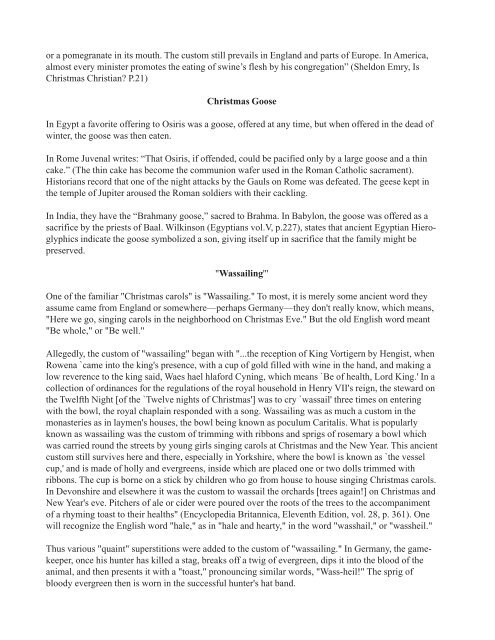Is Christmas Christian? By Peter Salemi - British-Israel Church of God
Is Christmas Christian? By Peter Salemi - British-Israel Church of God
Is Christmas Christian? By Peter Salemi - British-Israel Church of God
You also want an ePaper? Increase the reach of your titles
YUMPU automatically turns print PDFs into web optimized ePapers that Google loves.
or a pomegranate in its mouth. The custom still prevails in England and parts <strong>of</strong> Europe. In America,almost every minister promotes the eating <strong>of</strong> swine’s flesh by his congregation” (Sheldon Emry, <strong>Is</strong><strong>Christmas</strong> <strong>Christian</strong>? P.21)<strong>Christmas</strong> GooseIn Egypt a favorite <strong>of</strong>fering to Osiris was a goose, <strong>of</strong>fered at any time, but when <strong>of</strong>fered in the dead <strong>of</strong>winter, the goose was then eaten.In Rome Juvenal writes: “That Osiris, if <strong>of</strong>fended, could be pacified only by a large goose and a thincake.” (The thin cake has become the communion wafer used in the Roman Catholic sacrament).Historians record that one <strong>of</strong> the night attacks by the Gauls on Rome was defeated. The geese kept inthe temple <strong>of</strong> Jupiter aroused the Roman soldiers with their cackling.In India, they have the “Brahmany goose,” sacred to Brahma. In Babylon, the goose was <strong>of</strong>fered as asacrifice by the priests <strong>of</strong> Baal. Wilkinson (Egyptians vol.V, p.227), states that ancient Egyptian Hieroglyphicsindicate the goose symbolized a son, giving itself up in sacrifice that the family might bepreserved."Wassailing'"One <strong>of</strong> the familiar "<strong>Christmas</strong> carols" is "Wassailing." To most, it is merely some ancient word theyassume came from England or somewhere—perhaps Germany—they don't really know, which means,"Here we go, singing carols in the neighborhood on <strong>Christmas</strong> Eve." But the old English word meant"Be whole," or "Be well."Allegedly, the custom <strong>of</strong> "wassailing" began with "...the reception <strong>of</strong> King Vortigern by Hengist, whenRowena `came into the king's presence, with a cup <strong>of</strong> gold filled with wine in the hand, and making alow reverence to the king said, Waes hael hlaford Cyning, which means `Be <strong>of</strong> health, Lord King.' In acollection <strong>of</strong> ordinances for the regulations <strong>of</strong> the royal household in Henry VII's reign, the steward onthe Twelfth Night [<strong>of</strong> the `Twelve nights <strong>of</strong> <strong>Christmas</strong>'] was to cry `wassail' three times on enteringwith the bowl, the royal chaplain responded with a song. Wassailing was as much a custom in themonasteries as in laymen's houses, the bowl being known as poculum Caritalis. What is popularlyknown as wassailing was the custom <strong>of</strong> trimming with ribbons and sprigs <strong>of</strong> rosemary a bowl whichwas carried round the streets by young girls singing carols at <strong>Christmas</strong> and the New Year. This ancientcustom still survives here and there, especially in Yorkshire, where the bowl is known as `the vesselcup,' and is made <strong>of</strong> holly and evergreens, inside which are placed one or two dolls trimmed withribbons. The cup is borne on a stick by children who go from house to house singing <strong>Christmas</strong> carols.In Devonshire and elsewhere it was the custom to wassail the orchards [trees again!] on <strong>Christmas</strong> andNew Year's eve. Pitchers <strong>of</strong> ale or cider were poured over the roots <strong>of</strong> the trees to the accompaniment<strong>of</strong> a rhyming toast to their healths" (Encyclopedia Britannica, Eleventh Edition, vol. 28, p. 361). Onewill recognize the English word "hale," as in "hale and hearty," in the word "wasshail," or "wassheil."Thus various "quaint" superstitions were added to the custom <strong>of</strong> "wassailing." In Germany, the gamekeeper,once his hunter has killed a stag, breaks <strong>of</strong>f a twig <strong>of</strong> evergreen, dips it into the blood <strong>of</strong> theanimal, and then presents it with a "toast," pronouncing similar words, "Wass-heil!" The sprig <strong>of</strong>bloody evergreen then is worn in the successful hunter's hat band.


